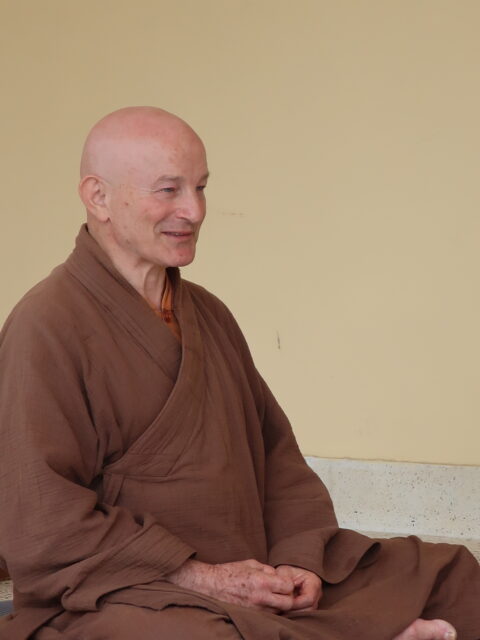
Meditation Retreat with Dhammadipa
The understanding of training in samadhi in the tradition of disciples and of Bodhisattvas is based on scriptures and personal experience in these two types of training.
The present course is suitable for all kinds of students interested in meditation on breath as the basis for training in both concentration and wisdom. The students will learn how the breath is used to develop different stages of absorption into the breath, in and out breath, whole body breath in the intermediate periods between in and out breath and ultimately for understanding of the insight practice in both traditions, that of disciples, and in the non-dualistic tradition connected with the bodhisattva training. A background in the study and practice of Theravada and Chinese tradition will be appreciated, but is not necessary. The main aim of the course is to share the experience of training assisted by outstanding teachers in both traditions.
Proposed schedule
5.30 a.m. wake up
6.00 to 7.00 Qi kong exercise
7.00 to 8.00 Meditation
8.00 Breakfast
9.00 to 10 Karma Yoga
10.00 a.m. to 1.00 p.m. Morning block, Dharma talk, Sitting and Walking Meditation.
1.00 p.m. to 3 p.m. Rest or Individual Practice.
3.00 p.m. to 5 p.m. Sitting and Walking Meditation.
From the third day, Individual Interviews
5.00 to 6.00 Tea break.
6.00 to 9.00 p.m. Dharma talk, Question and Answers, Satsang, Sanskrit or Pali Recitation,
And Metta meditation.
After 9.00, Either Rest or Individual Practice
The Teacher:
Now 76 years old, Dhammadipa (Thomas Peter Gutman) was born in Czechoslovakia in 1949. He studied Chinese Literature and Philosophy at Prague University, graduating in 1969, and then studied Russian Literature at the Hebrew University of Jerusalem, where he received a degree in 1973. In the late seventies, Dhammadipa began his Buddhist studies in Berlin, where he had immigrated as a refugee after the Soviet invasion of Czechoslovakia. In 1977, he received a master’s degree in Chinese Literature and Philosophy at the University of Paris. In 1979, he enrolled at Nalanda University in India (where he also taught French and German) to study Sanskrit and Buddhist Philosophy. After receiving a degree at Nalanda in 1984, he returned to serve as the Associate Librarian at Berlin University. In 1986, Dhammadipa went to Japan and studied under Zen Master Harada Serrei Roshi of the Sōtō school (Caodong in Chinese) practice. He was given a Dharma name, Xing-Kong (meaning Nature of Emptiness).
In 1986, with the encouragement of Venerable Athurugiriye Nyanavimala Mahathera, Venerable Wijayasoma Mahathera, and Venerable Dikwelle Mahinda, he was ordained as a monk in Meetirigala and was given a Dharma name, Dhammadipa (Island of Buddhism or Dharma). He received full Theravada Bhikkhu ordination in Sri Lanka, where he practised meditation under the guidance of his preceptor, Venerable Nanarama Mahathera. In 1989, he received the Threefold Ordination as a Mahayana monk in Hsi Lai Temple, Los Angeles, and began Dharma teaching in the US, Germany, and Taiwan.
In 1996, Dhammadipa went to Myanmar to practice meditation with the contemporary master Venerable Pa Auk Sayadaw and was recognized by the Sayadaw to be the first of the Sayadaw’s Western disciples qualified to teach meditation. He has since been teaching Samatha (tranquil mental states) and Vipassana (direct seeing of the Dharma) meditation at monasteries and universities worldwide.
Dhammadipa speaks Czech, French, German, English, Russian, and fluent Chinese. He reads and translates Buddhist texts from Pali and Sanskrit. His translated works in French and Czech include Treatise on the Awakening of Faith in the Mahayana (Mahayanasraddhotpada-Sastra), Entry into the Bodhisattva Path (Bodhicaryavatara), and a collection of Han Shan’s poems. His teachings in Taiwan have been compiled and printed in Chinese.
Over the years, Dhammadipa has presented Dharma teachings and led meditation retreats around Europe, North America, Taiwan, mainland China, India, and Southeast Asia. His teaching follows the framework of the classic Theravada Buddhist commentary The Path of Purity (Pali: Visuddhimagga): one starts with training in the precepts (virtue), which lays the foundation for training in concentration and then the development of wisdom. Dhammadipa teaches that knowledge of the Buddhist way should be applied in practice and verified first-hand through direct experience. One should make a great vow to tread the way and realize the Dharma for the benefit of all sentient beings.
Due to sickness, Dhammadipa was disrobed two years ago. He is a rare gem in contemporary Buddhism.
He established a meditation centre, Shanta Vana, in the Czech Republic.
He published four books on Buddhism in Chinese, two in Czech; this year, two other books in Czech and one in English are to be published.
For queries, registration & accommodation, please email: info@deerpark.in
